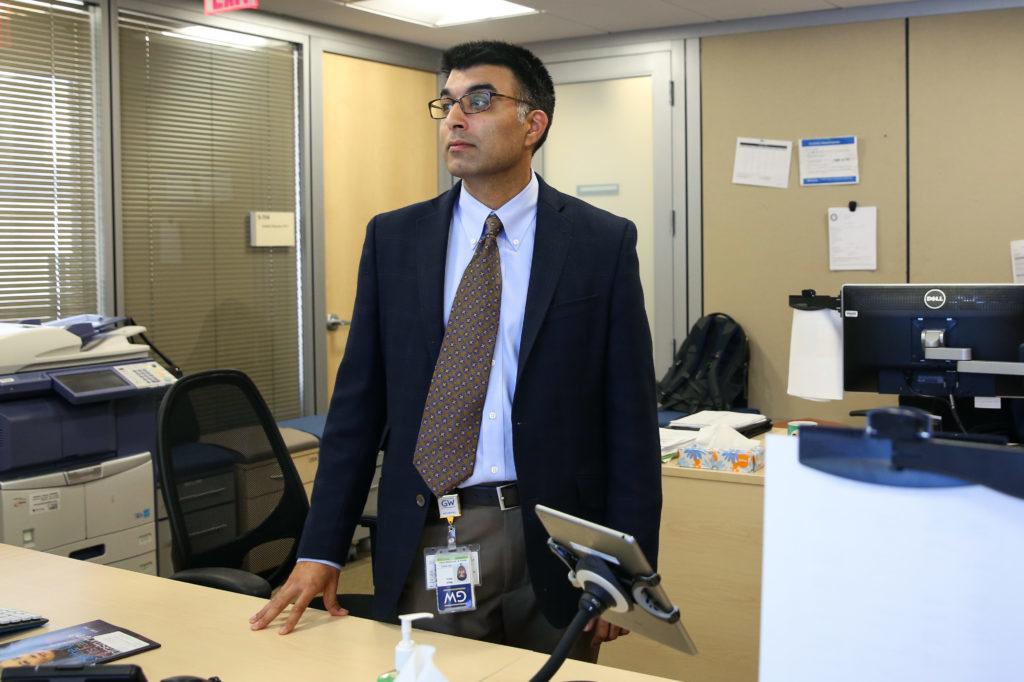When defense contractors are wounded in the line of fire in Iraq, GW doctors work to save their lives – from a nerve center thousands of miles away on Eye Street.
The GW Medical Faculty Associates expanded a program last month to provide remote medical care through email, phone, text and video to defense contractors in Iraq working for SOS International, a U.S. government contracting firm, according to a company representative. The program allows American contractors access to immediate routine and emergency medical care without making a long trek to a hospital, doctors and company officials said.
MFA – an independent physician practice group that includes faculty from the School of Medicine and Health Sciences – and SOSi provide virtual physical exams to contractors or guide doctors on the ground through medical examinations and initial treatment using a video conference, Neal Sikka, an associate professor of emergency medicine and a doctor in the program, said.
The technology – known as telemedicine – allows contractors to receive medical care for conditions like dehydration in remote regions of Iraq where transporting medical supplies is difficult and the nearest hospitals and clinics can be hundreds of miles away, Thomas Berger, the medical program manager for SOSi, said.
“The ability for the physician to see live vitals and to have a video-streaming conversation, whether it’s a behavioral health console, or a cardiac console, or to assist myself or one of my staff in suturing a wound closed, that’s the kind of expertise features that this program gives us in a very, very distant land,” he said.
Seventeen lives have been saved since the partnership began, Frank Helmick, SOSi vice president for mission solutions, said.
The military uses civilian contractors across its branches to support service members in various roles. SOSi provides logistical aid, including helping to fix tanks and airplanes or construct roads, according to company officials.
SOSi first contacted MFA, which also mentors GW medical students, in the spring of 2016 to help improve medical care to its roughly 1,500 employees in Iraq, Berger said. The company decided to work with GW’s program because of its 20 years of experience providing telemedicial care to sailors in the maritime industry through its Worldwide Emergency Communications Center, he said.
For several months, the two companies worked together slowly to test the waters and assess the feasibility of the project. They officially announced their partnership Aug. 1, Berger said.
Kai Neander, the program manager of innovative practice at MFA, said the organization offers telemedical care to the State Department and its embassies around the world.
“You never know what’s going to come across the desk,” Neander said. “Every day is different. Every day is interesting. Cases are diverse, complicated, complex and we get to work with fascinating providers and great people around the world who do some pretty cool things.”
Initially, GW’s telemedicine program was geared toward the maritime industry, providing medical advice and expertise when crew members on commercial ships would fall ill or become injured out at sea. Since then, MFA has expanded its reach to care for patients at remote research stations, private aviators, travelers to exotic and distant lands and some U.S. embassies, Sikka — an MFA doctor — said.
Doctors on telemedicine calls may have to guide first responders or the patients themselves to complete on-the-spot treatment, he added.
“Most people are not carrying anything,” Sikka said. “It’s really a lot of clinical management, guiding a first responder or layperson through their own exam, or making risk assessments based upon injury or a location.”
Patients can connect with more than 550 MFA doctors, including seven to nine specialists in emergency medicine, who take calls 24 hours a day, seven days a week, according to the program’s website. Sometimes the doctors stay in close contact for hours or days with patients who are far away from health care, Sikka said.
Sikka declined to comment on specific cases, including how the 17 lives were saved, citing privacy concerns.
Telemedicine allows doctors to provide professional consultation quickly – determining whether they need to medically evacuate someone to a more well-supplied hospital, or whether they can treat them onsite. Previously, no doctor would be readily available to tell contractors they did not need to be evacuated off base, Helmick said.
“It’s an incredible advantage and it saves the company, and the company this guy works for, lots of money,” he said. “And it saves his life.”





